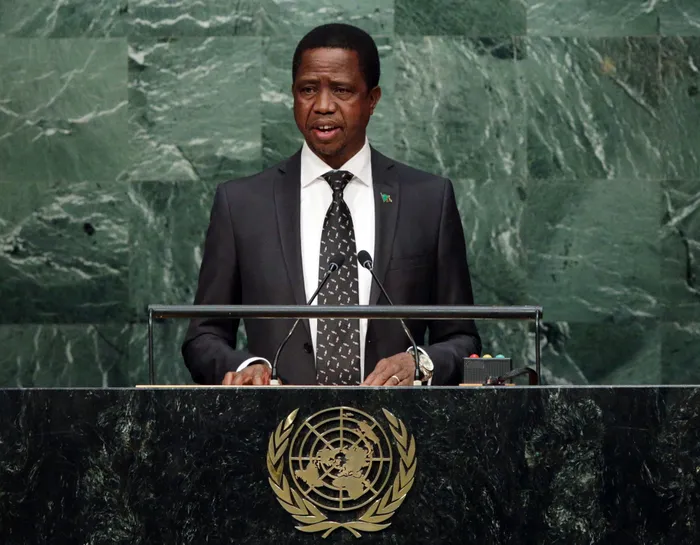Diplomatic tensions mount as Zambia and Lungu’s family clash over burial in South Africa
BITTER DISPUTE

Former Zambian President Edgar Chagwa Lungu's death has triggered a bitter dispute between his family and the Zambian government led by President Hakainde Hichilema.
Image: File
A diplomatic and legal impasse over the burial of former Zambian President Edgar Chagwa Lungu has sparked tensions between Lusaka and Pretoria, exposing deep political rifts and challenging cross-border legal norms.
On Wednesday, moments before a private burial ceremony was set to begin at Johannesburg’s Cathedral of Christ the King, the High Court in Pretoria issued an emergency order halting the proceedings.
The decision followed a petition filed by Zambian Attorney General Mulilo Kabesha, who argued that Lungu, as a former head of state, must be accorded a full state funeral in Zambia. Lungu, 68, died earlier this month in South Africa while receiving treatment for an undisclosed illness.
His death has since triggered a bitter dispute between his family and the Zambian government led by President Hakainde Hichilema.
At the heart of the standoff is a fundamental disagreement: Lungu’s family insists that one of his final wishes was to be buried privately, away from the political theatre of Lusaka, and without the involvement of his successor and long-time rival, Hichilema.
In contrast, the Zambian government maintains that, as a former president, Lungu must be buried on Zambian soil with full military honours — and with the current head of state presiding.
While the Zambian state prepared for a formal reception of Lungu’s remains in Lusaka, complete with military honours and a public funeral, the family quietly made arrangements for a private burial in South Africa.
The Pretoria court’s ruling has now placed the funeral in limbo, pending a full hearing scheduled for August 4. South African officials have found themselves caught in the middle of the high-stakes diplomatic and legal standoff.
The Department of International Relations and Cooperation (DIRCO) has declined to comment publicly but confirmed it is engaging both parties to ensure compliance with South African law.
“We recognise the sensitive nature of this matter,” a DIRCO spokesperson said. “We are working closely with the Zambian authorities and the family to support a peaceful resolution.”
Zambian Foreign Affairs Minister Mulambo Haimbe addressed the issue during a live interview in South Africa, calling for cooler heads to prevail.
“This situation is regrettable,” Haimbe said. “We must honour our former president with dignity, but also uphold the rule of law and the unity of our nation.”
Observers say the dispute is as much about legacy as it is about politics. Lungu and Hichilema’s acrimonious relationship dates back years.
After losing the 2016 presidential election to Lungu, Hichilema was arrested and charged with treason — a move widely viewed as politically motivated. After defeating Lungu in the 2021 polls, Hichilema accused his predecessor of corruption and abuse of power, deepening their political enmity.
Lungu’s body remains in South Africa, a symbol of unresolved wounds in Zambia’s democratic journey.